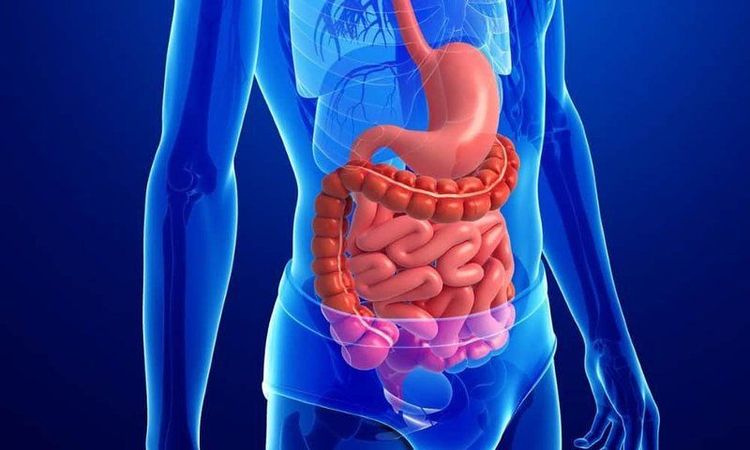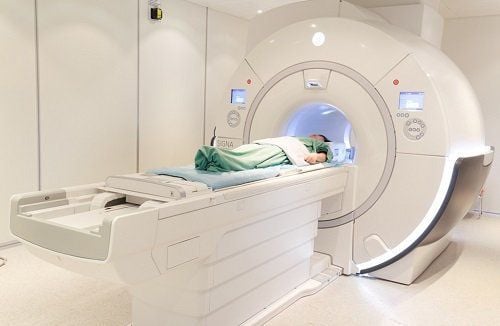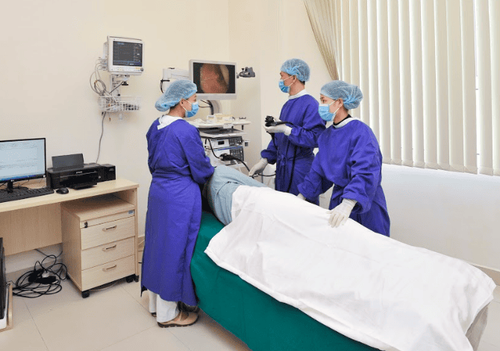This is an automatically translated article.
The article was written by Dr., Doctor Bui Xuan Truong - Department of General Internal Medicine - Vinmec Times City International General Hospital.Colorectal cancer is one of the five most common types of cancer, every year about 1.23 million new colorectal cancer patients are diagnosed worldwide and about 600,000 patients die from colorectal cancer. -rectal.
1. The role of the digestive system The human body is a unit, every organ has a function–no part is considered superfluous, not even the appendix. We are only truly healthy when every organ in our body is healthy.
We know that eating is an indispensable need in life, to have delicious meals requires a healthy body combined with a refreshing spirit. The digestive system plays a key role in absorbing nutrients to nourish the body, regardless of any disorder in the digestive system, it leads to a change in the absorption of nutrients, depending on the location and extent. which has more or less effect.
Digestive disorders are very common, this is one of the groups with the highest rate. However, many of us are subjective to common digestive disorders, that subjectivity often suffers unnecessarily heavy consequences if we pay attention and go to the doctor early.

Các rối loạn về tiêu hóa rất thường gặp, đây là một trong những nhóm bệnh lý có tỷ lệ cao nhất
3. Why screen for colorectal cancer In general, worldwide, colorectal cancer is the most common in men after lung and prostate cancer, in women The prevalence is second only to breast cancer. In many developing countries, the disease tends to increase gradually with the quality of living standards and changes in traditional eating habits. Japan is a good example of this change, after World War II, along with economic development success is the use of fast food and European style dishes- America more, has increased the rate of colorectal cancer in the island nation of the rising sun.
In Vietnam, colorectal cancer also ranks among the top five most common cancers, in men, colorectal cancer ranks third after lung cancer and stomach cancer, in women Colorectal cancer also ranks third after breast cancer and cervical cancer.
Stemming from the prevalence and mortality rate of colorectal cancer, many countries around the world, especially European and North American countries and some developed countries have introduced cancer screening colorectal to the routine monitoring program of the Health system. Colorectal cancer, if detected and treated early, will give very good results, the survival rate of over 5 years of patients is very high: over 90%, of which many people have a longer survival time. over 10 years. Meanwhile, if the disease is diagnosed and treated at a late stage, with metastases, the 5-year survival rate drops to only 10%. Therefore, the issue of screening and early diagnosis of colorectal cancer is very meaningful for the patient himself, his family and society.

Tầm soát, chẩn đoán sớm ung thư đại–trực tràng rất có ý nghĩa cho bản thân người bệnh, gia đình người bệnh và xã hội
(1) Stool testing includes: • Testing for red blood cells, blood in stool • Testing at the molecular level (DNA analysis).
(2) Morphological-structural tests are divided into two main groups: a) endoscopic techniques: • Flexible bronchoscopy • Wireless endoscopy (capsule endoscopy) b) group of imaging techniques: • X-ray with contrast agent (double contrast barium enema) • Computed tomography (computed tomography of the colon - CT technique) colonography) • Nuclear magnetic resonance imaging (MR colonogrpahy technique)

Chụp cộng hưởng từ hạt nhân
With the current development of science and technology in general and medicine in particular, the techniques applied in practice to screen and diagnose colorectal cancer at an early stage will be more and more perfect. At the same time, new techniques will be introduced in the future, as well as some previously used techniques that will be used less often.
However, there is one thing you should know, with current testing techniques, if you only apply a single technique, no matter how perfect and how perfect the operator is, it can still be missed. diagnose colorectal cancer in a certain proportion, especially early-stage cancer. Therefore, you should not be too surprised that sometimes doctors recommend that you combine several methods. And you should not rush to attribute the doctor to a bad degree, because a few cases, despite combining many methods with leading experts to analyze the results, are still very difficult to determine. be accurate.
Why is that, because each type of test has its own advantages, disadvantages and limitations. There are tests that only help screen whether a patient is at high risk, there are tests that both screen and diagnose, there are tests (technologies) that have both screening-diagnostic and development capabilities. reported treatment intervention. Likewise, there are tests that are cheap and easy to deploy in the community, there are tests that are expensive and difficult to deploy in the community. Therefore, at present, depending on specific conditions, each country has a different strategy. The United States has a strong economy with a world-class medicine, but experts have not reached a complete consensus on the practice guidelines for colorectal cancer screening.
However, in general, regardless of the point of view, specialist doctors recommend that in areas with high rates of colorectal cancer, including Vietnam, people over 50 years old should go for a check-up. Screening and screening for colorectal cancer once a year. As for the specific method to use, you need to go to the doctor and consult, based on the specific information and conditions that the specialist doctor will give you advice. For people under 50 years old, on a case-by-case basis, the specialist doctor will advise whether to screen for colorectal cancer or not.
Colorectal cancer screening should be conducted at reputable facilities, ensuring both expertise and equipment, to ensure that the screening takes place safely and accurately.
Vinmec International General Hospital is implementing a Package of Screening and Early Detection of Colorectal Cancer, implemented by a team of experienced doctors and nurses in the field of colorectal cancer diagnosis and treatment. colonoscopy, with the support of a system of modern technological equipment, a full range of specialized means to diagnose the disease and stage it before treatment such as: Endoscopy, CT scan, PET-CT scan, MRI, Mammogram, histopathological diagnosis, gene-cell testing, ... help detect colon cancer early even when there are no symptoms.
Vinmec International General Hospital is one of the hospitals that not only ensures professional quality with a team of leading medical doctors, modern equipment and technology, but also stands out for its examination and consultation services. comprehensive and professional medical consultation and treatment; civilized, polite, safe and sterile medical examination and treatment space.
If you have a need for consultation and examination at Vinmec Hospitals under the national health system, please book an appointment on the website for service.
Please dial HOTLINE for more information or register for an appointment HERE. Download MyVinmec app to make appointments faster and to manage your bookings easily.













